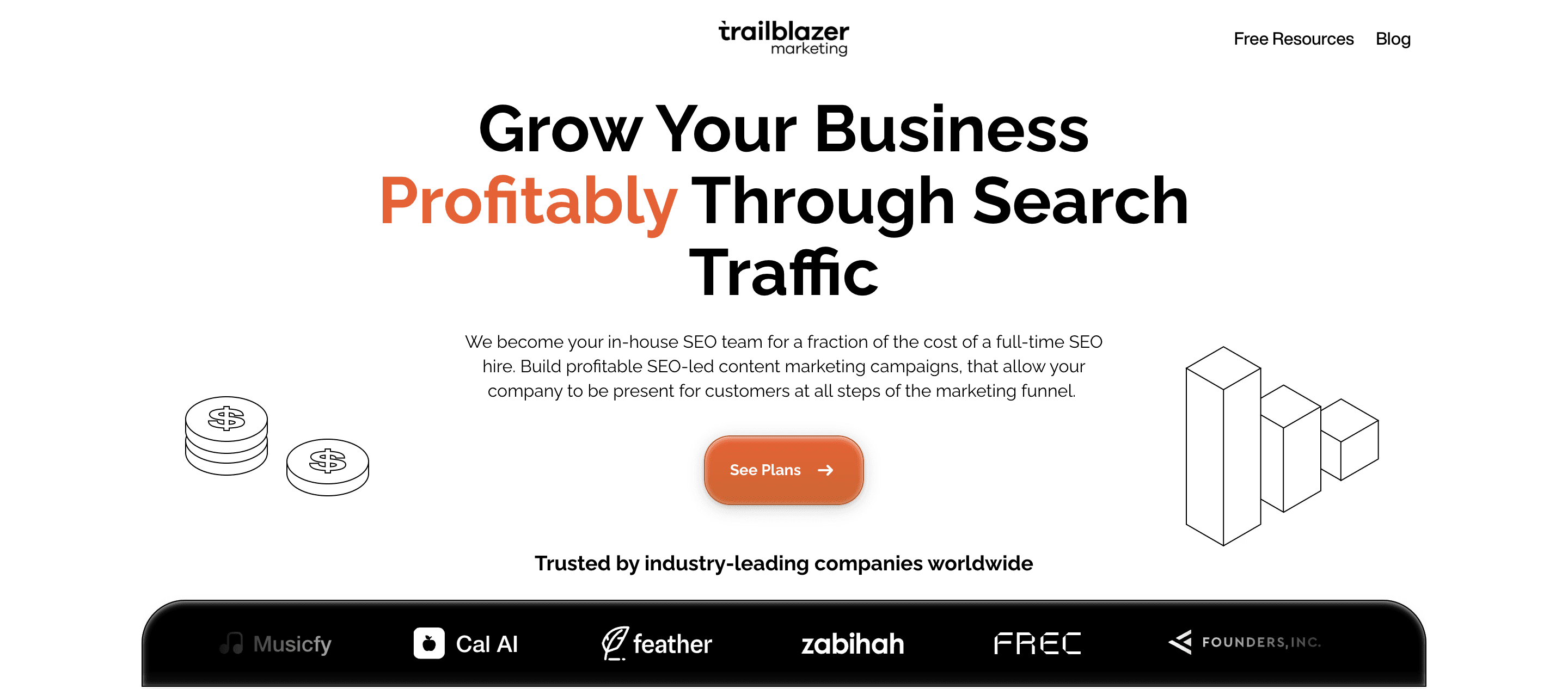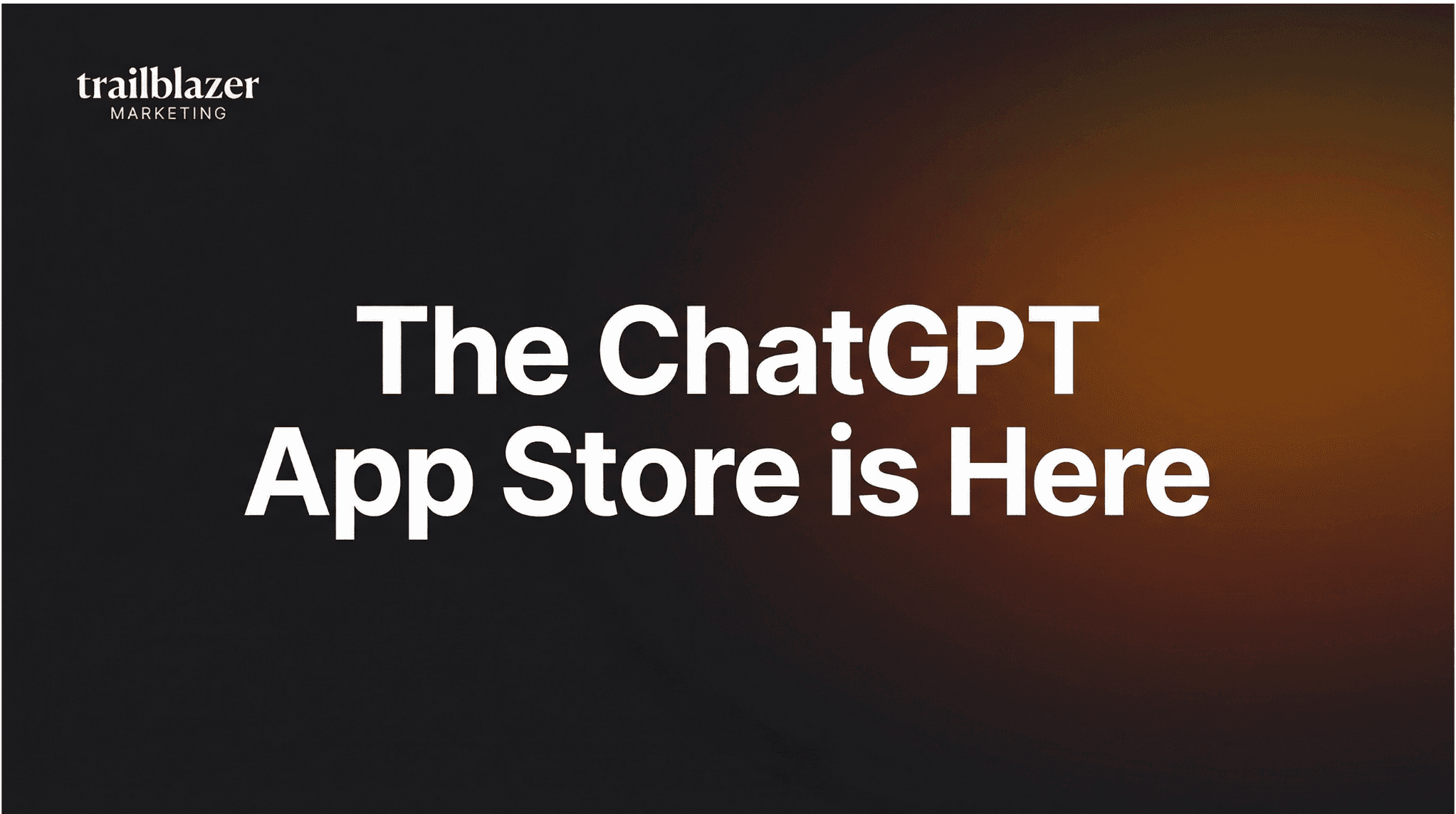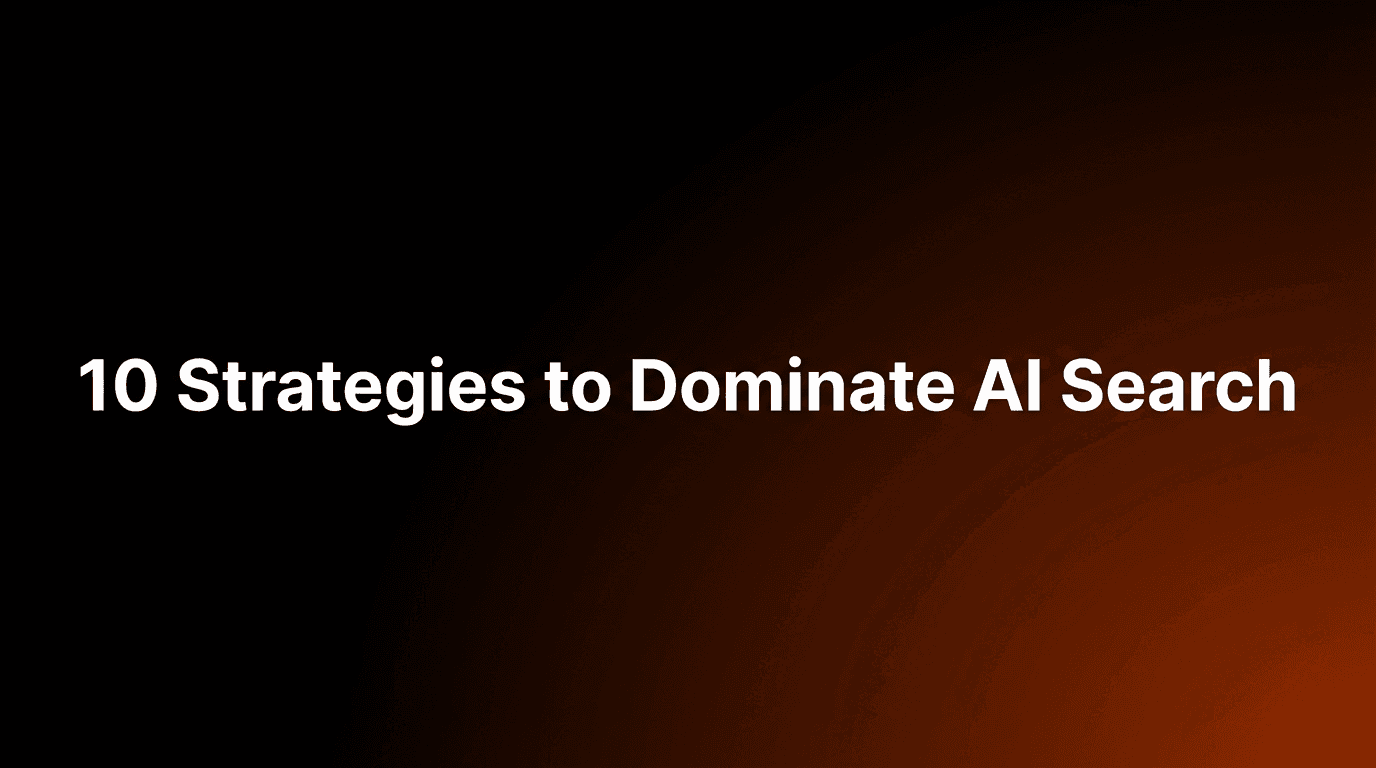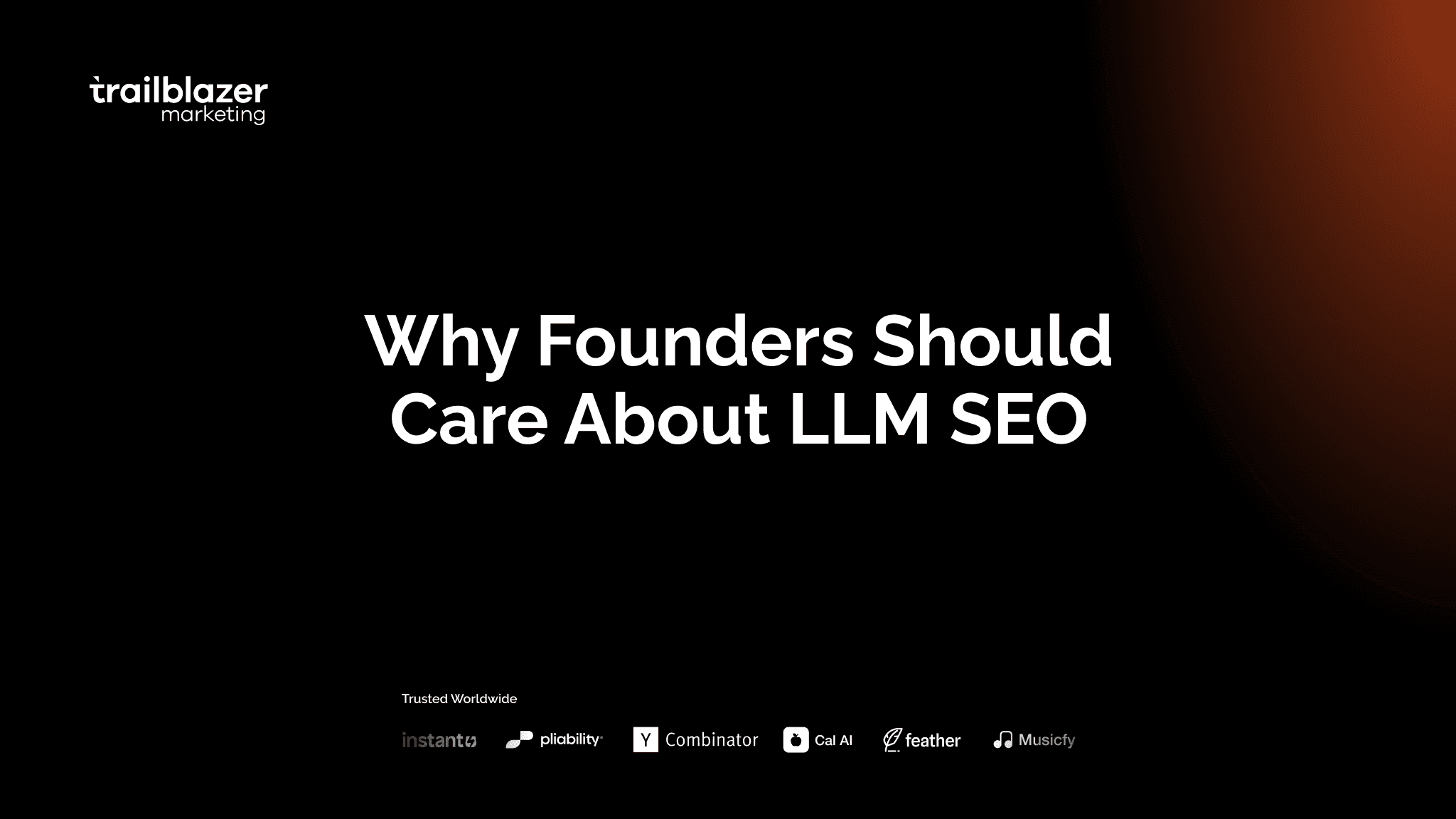Rank #1 on Generative AI Search Engine with these Optimization Strategies
Apr 3, 2025
Rank #1 on Generative AI Search Engine with these Optimization Strategies
Search engine optimization used to be straightforward. You could say what you needed to say to get indexed by search engines and then move on. Today, things are different. With the emergence of AI, search engines and SEO have changed. Now, it's not enough to provide informative content for human readers. The algorithms driving generative AI searches want to see content that caters to AI, and that's where generative AI optimization comes in. This article will show you how to use this new SEO strategy to achieve top search rankings with AI-driven SEO tactics that maximize traffic, engagement, and conversions.
Trailblazer Marketing can help you achieve your objective of ranking number one on Google and AI search. This valuable tool effortlessly attains top search rankings with AI-driven SEO strategies that maximize traffic, engagement, and conversions.
Table of Contents
What is Generative AI Search Engine Optimization?

Generative AI SEO leverages artificial intelligence to create and optimize content that aligns with search engine requirements. The approach uses AI-driven content generation, search intent analysis, and optimization techniques to improve rankings. The key difference between Generative AI SEO and traditional SEO is the ability to create dynamic, intent-driven content at scale. Also known as Generative Engine Optimization (GEO), this method focuses on improving content visibility to AI-driven search engines like ChatGPT that deliver contextually relevant responses.
Why It Matters?
Generative AI refers to a class of artificial intelligence systems that can create new, original content based on patterns and information they’ve learned from vast datasets. These systems use advanced machine learning techniques, primarily deep learning and neural networks, to understand and mimic human-like content creation.
LLM Disruption: Quantifying Workforce Impact and Implications for Marketers.
In a GenAI study called “GPTs are GPTs” conducted by Tyna Eloundou, Sam Manning, Pamela Mishkin from OpenAI, and Daniel Rock from the University of Pennsylvania, it was found that: Approximately 80% of the U.S. workforce could have at least 10% of their tasks affected by LLMs. About 19% of workers may see at least 50% of their functions impacted. The effects span all wage levels, with higher-income jobs potentially facing greater exposure. These insights led me down the path of determining the impact of AI on Marketers and how it would impact our roles. The findings were pretty staggering:
Key Highlights on Generative Engine Optimization (GEO)
Generative Engine Optimization (GEO) combines SEO with AI, optimizing for AI-driven search engines like ChatGPT and Gemini that generate contextually relevant responses. GEO enhances content visibility by aligning it with AI-generated search requirements, emphasizing clarity, relevance, and authority. Conversational content optimized with quotations, statistics, and direct answers improves AI search rankings. GEO strategies include fluency, authoritative sources, and technical terms to increase user engagement. This method benefits sites with lower traditional rankings and adapts content for AI-specific SERP features.
The Evolution of Search: SEO to SGE to GEO
To fully understand Generative Engine Optimization, I think it’s good to see it in the context of the progression of how digital content interacts with search technologies, especially with the integration of artificial intelligence:
SEO (Search Engine Optimization):
Optimizing websites to rank higher in search engine results pages and attract more organic traffic. Traditional SEO focuses on understanding search engine algorithms and optimizing content accordingly, using:
Keywords
Meta tags
Backlinks and other strategies
Dominant in the early stages of the internet and web search engines, continuing to be fundamental today.
Objective: To increase a website’s visibility and user traffic by aligning content with what search engines deem valuable.

SGE (Search Generative Experience):
Enhancing the search experience using generative AI technologies to provide more relevant, contextual, or comprehensive responses to queries. SGE involves AI to directly generate answers, summaries, or conversational interactions based on user queries. Emerges with the advancement of AI and machine learning technologies, offering a more dynamic and interactive search experience.
Objective: To make search more efficient and user-friendly by leveraging AI to understand better and anticipate user needs.

GEO (Generative Engine Optimization)
Adapting content optimization strategies to align with the capabilities and expectations of AI-driven search engines. GEO combines traditional SEO techniques with understanding how generative AI models process and prioritize content. This represents a more recent phase, acknowledging the significant role of AI in shaping search experiences and the necessity of optimizing content for these AI-driven environments.
Objective: To ensure content is discovered, accurately interpreted, and favorably ranked by AI-enhanced search engines. It might be helpful to further drill down on the differences between Search Engine Optimization, Search Generative Experience and Generative Engine Optimization:
You could say that:
From SEO to SGE: This transition reflects a shift from purely algorithmic search optimization towards enhancing the search experience with AI, focusing on user interaction and satisfaction.
From SGE to GEO: This step acknowledges the pervasive influence of AI on search technologies, necessitating a new approach to content optimization that goes beyond traditional SEO to include AI-specific considerations.
The Scientific SEO Approach: Achieving Unprecedented Growth in the AI Era
Trailblazer Marketing serves as your dedicated SEO team, driving profitable growth through strategic content that ranks prominently in both Google and Bing and AI search platforms like:
ChatGPT
Claude
Perplexity
Our scientific approach has delivered extraordinary results across industries. It helps companies rank number 1 on Google and AI search, including a B2C SaaS client with a 3,518% increase in non-branded traffic within 21 days. This client generated 2.1M organic clicks and over $700,000 in first-year revenue, far exceeding its $300,000 ARR goal. Similar success stories include a B2B SaaS client achieving 9,644% traffic growth within 10 months and a mobile app seeing a 65 %+ increase in downloads within 50 days.
Limited Availability: Secure One of Three Monthly Spots for Proven SEO Growth
Our comprehensive methodology sets us apart:
Long-term planning
Product-led keyword research
Competitive analysis
Strategic backlink building
High-velocity content production
Most SEO agencies require thousands per month upfront. Still, our $300 Validate Program lets you test our process with 10 SEO-optimized articles and see actual results within 30 days before committing to a more significant investment. We only have three spots available monthly; reserve yours today.
Related Reading
How Does Generative AI Search Engine Optimization Work?

The emergence of generative engines is a significant evolution in search engines. Unlike traditional search engines, which primarily provide a list of relevant websites, generative engines go further by generating multimodal responses synthesized from multiple sources.
Generative Engine Optimization (GEO)
GEO refers to optimizing online content for better visibility and performance in search engines that use generative AI technologies. This could involve understanding how generative AI models interpret and prioritize content and then tailoring content to align with those parameters.
Applications
This includes optimizing content to be more easily summarized by AI, ensuring that content is structured so that generative models can understand and prioritize, or creating content that answers questions more directly to be favored by AI-driven query responses.
Focus
GEO focuses on content creators and marketers who aim to improve their content's performance in search results in an era when search engines leverage AI to generate responses.
Search Reimagined: Tracing the Shift from Link-Based to AI-Driven Information Synthesis
Ten years ago, if you wanted to know about a particular topic, you would query a search engine and get a list of website links with information on that subject. Today, with the rise of AI-powered tools like ChatGPT, you can type in a prompt and get a direct answer with little to no reference to external websites. The recent success of large language models (LLMs) has paved the way for better systems like BingChat, Google's SGE, and perplexity.ai, which combine the strength of conventional search engines with the flexibility of generative models. We dub these new-age systems generative engines (GE) because they search for information and generate multimodal responses by synthesizing multiple sources. Here’s a look at perplexity.ai, a chatbot-style search engine:


In other words, this approach combines the power of conventional SEO techniques with the flexibility and sophistication of generative engines, such as Google’s Search Generative Experience (SGE).
Traditional vs. Generative Search: A Side-by-Side Analysis of Information Retrieval
What is interesting is the picture below: On the left side, this is what a traditional search engine looks like when you search, for example, for things to do in New York. The number one result is Central Park in New York, number two is the Statue of Liberty, and the third result is New York-style pizza. So you get the typical 10 blue links, as we are all familiar with:

Optimizing for ChatGPT and Gemini
The advent of large language models like ChatGPT and Gemini has introduced a new era of search engines that synthesize information from various sources to provide comprehensive, conversational responses. Optimizing your content for ChatGPT and Gemini can significantly enhance your visibility. For these generative engines, optimizing involves tailoring your content to be more persuasive, authoritative, and rich in relevant keywords and statistics. Regarding GEO, brand mentions and relevancy are pivotal in determining search engine rankings. NP Digital has already looked at factors causing ChatGPT and Gemini to recommend sites. Remember that if you want to optimize for ChatGPT, you have to wait for their index to update.

Performance Metrics: Winner Takes All
The research document proposes impression metrics tailored specifically for generative engines, providing a framework for evaluating the effectiveness of Generative Engine Optimization strategies.
Strategies for Success: Optimizing with GEO
The competition is fierce in AI-generated recommendations, with the top-ranked responses capturing the lion's share of visibility. This “winner takes all” scenario accentuates the need for a meticulously optimized presence so that your content not only ranks but dominates in the generative search engine space. The evidence suggests that employing GEO strategies can lead to an average 30% impression improvement. This significant uplift nods to the effectiveness of adapting content to meet the criteria favored by generative engines, highlighting, in enhancing content visibility, the importance of:
Authoritative sources
Statistical data
Clear, fluent language
Content Structure and Clarity
GEO ensures your content meets AI algorithms' standards for understanding, interpreting, and prioritizing information. Here's how to structure your content effectively.
Content Clarity
Ensure your content is clear and concise, emphasizing the most important information early on. This helps AI quickly grasp the core message and improves user engagement. Use straightforward language and avoid jargon to communicate your key points effectively.
Introductory Sentence
Start each page with a concise introductory sentence highlighting the primary purpose or topic. This sets the context for AI and users, improving engagement and understanding.
Content Readability
Use headings, bullet points, and multimedia elements to enhance readability. This structure satisfies user queries and AI's need for organized, relevant information.
Structured Data
Use structured data, such as schema markup, to help AI better understand your content. Markup elements like articles, reviews, and products to improve how your content is displayed in search results and increase the chances of appearing in prominent features like knowledge panels and snippets.
Direct Answers to Queries
Provide direct and concise answers within the first few sentences of your content. AI favors content that quickly addresses user questions, increasing the likelihood of being featured in AI-generated responses.
Highlight Key Information
Use bullet points, numbered lists, and tables to emphasize important points, making it easier for AI and users to scan and understand your content.
Optimize Headers
Use clear, descriptive headers to organize your content. This helps AI algorithms understand the hierarchy and main points, improving relevance and readability.
Content Distribution and Engagement
GEO enhances your content's reach and impact by ensuring it is distributed and engaged effectively. In the era of AI, content distribution is not just about getting your content out there but about strategically placing it where AI systems can easily access, process, and prioritize it. Here's how to implement these strategies:
Distribute Across Platforms
Large language models (LLMs) like those used by AI-driven search engines are trained on content found in blog posts and within communities like Reddit and Quora. Distribute your content through these channels to maximize your ability to influence the stories and responses generated by AI systems.
User-Generated Content (Ugc)
Encourage reviews, testimonials, and social media posts to add authenticity and diverse perspectives to your content. UGC makes your content more relatable and trustworthy, boosting engagement and signaling activity to AI platforms. Regular updates with UGC align with user queries and improve search discoverability, as AI systems prioritize fresh and relevant content.
Leverage Social Media
Share your content on social media platforms to increase its reach and engagement. Generative AI also uses signals from social media to rank and index content. By maintaining an active presence on social media, you can ensure that AI-driven platforms pick up and promote your content, enhancing your visibility and engagement.
Community Building
Create and nurture a community around your brand through forums, social media groups, or dedicated platforms. Engaging with your community can lead to more user-generated content, feedback, and brand loyalty. Active communities provide a steady stream of fresh content and interactions that AI systems can analyze and prioritize, boosting your content's visibility.
Brand Authority and Credibility
GEO enhances your content's visibility and trustworthiness by building and maintaining brand authority and credibility, which appeals to AI's emphasis on authoritative and credible sources.
Consistency
Ensure your brand's messaging, data points, and key information are uniform across your website, social media profiles, and other platforms. Consistent information builds trust and authority, helping AI algorithms generate accurate responses and reinforcing your credibility.
Offline Reputation
Maintain a positive offline reputation, as it directly influences your online presence. Just as Google's algorithm factors in offline brand reputation for online rankings, AI platforms also consider your brand's overall reputation. Strong offline credibility enhances your authority in the GEO space, ensuring your content is perceived as trustworthy and authoritative.
Backlinking
Acquire high-quality backlinks from authoritative and relevant sites to boost your content’s credibility. Engage in content marketing efforts like guest blogging, creating shareable infographics, and publishing original research to attract organic backlinks. A robust internal linking structure also helps AI understand content relationships on your site.
Ethical And Transparent Practices
Ensure all content is ethically created, avoiding manipulative practices that could lead to penalties. Be transparent about data sources, affiliations, and sponsorships to build trust and credibility with users and AI.
Technical SEO
GEO integrates with traditional technical SEO practices to ensure your site is technically sound and accessible, essential for AI algorithms to discover and prioritize. Key components include:
Optimizing HTML Tags
To improve content structure, use appropriate HTML tags, such as:
Title tags
Meta descriptions
Header tags
Mobile Optimization
Ensuring the website is fully responsive and provides a seamless user experience across all devices.
Improving Loading Speed
Implementing best practices for faster loading times, such as:
Compressing images
Leveraging browser caching
Optimizing code
Fixing Crawling And Indexing Issues
Regularly check for and resolve issues that could prevent search engines from crawling and indexing the site effectively.
Enhancing Site Security
Using HTTPS ensures a secure connection, which search engines favor and provides better user trust.
Experiment and Iterate
GEO will continue to evolve, requiring marketers to stay flexible and creative.
Here's how to keep up:
Try Different Content Types
Mix things up with various formats, such as articles, videos, infographics, and interactive elements. If you usually write blog posts, try creating a video series or infographics to see what resonates best with your audience and AI platforms.
Continuous Testing
Use A/B testing to find what works best and keep tweaking to improve visibility on AI-driven platforms. Continuously experiment with different content formats and structures and stay informed on how AI algorithm preferences and response patterns are evolving for your key queries. Additionally, AI favors fresh content, so frequent testing provides more updates, which can enhance your visibility.
Learn And Adapt
Pay attention to which content gets the most engagement. Based on these insights, refine your strategies and make data-driven decisions to stay effective. Be prepared to adapt quickly to new trends and changes in AI algorithms.
Stay Updated
Follow industry blogs, attend webinars, and join forums to keep up with the latest trends and technologies in AI and GEO. Engage with the community to exchange insights and stay informed about emerging practices and developments.
Related Reading
Validate SEO for $300 - 3 Spots Available per Month | Reserve Your Spot Today

There’s no denying the growing importance of SEO in today’s digital world. Generative AI is changing how we think about SEO, so it’s more important than ever to stay on top of the latest trends and understand how they impact your business. At Trailblazer Marketing, we serve as your dedicated SEO team, driving profitable growth through strategic content that ranks prominently in both Google and Bing and AI search platforms like:
ChatGPT
Claude
Perplexity
Our scientific approach has delivered extraordinary results across industries. It helps companies rank number 1 on Google and AI search, including a B2C SaaS client with a 3,518% increase in non-branded traffic within 21 days. This client generated 2.1M organic clicks and over $700,000 in first-year revenue, far exceeding its $300,000 ARR goal. Similar success stories include a B2B SaaS client achieving 9,644% traffic growth within 10 months and a mobile app seeing a 65 %+ increase in downloads within 50 days.
Product-Driven SEO: A Methodology for Measurable and Sustainable Growth
Our comprehensive methodology sets us apart:
Long-term planning
Product-led keyword research
Competitive analysis
Strategic backlink building
High-velocity content production
Most SEO agencies require thousands per month upfront. Still, our $300 Validate Program lets you test our process with 10 SEO-optimized articles and see actual results within 30 days before committing to a more significant investment. We only have three spots available monthly; reserve yours today.
The Generative AI Shift: What It Means for SEO
Before we discuss optimizing for generative AI, let’s explore this technology and how it impacts traditional SEO. Generative AI is a subset of artificial intelligence that uses existing data to create new content. Unlike standard AI, which analyzes data to provide answers, generative AI can produce original text, images, and other media that mimic human creation. For example, ChatGPT analyzes billions of data points to generate answers to user queries that can seem almost human. The results are changing the way users interact with search engines. Instead of sifting through pages of links to find the information they need, users can now ask a generative AI search engine a question and receive immediate, relevant responses. This shift has changed the game for SEO.
What Makes SEO for Generative AI Different?
With standard search engine optimization, the goal is to create content that ranks well on Google and drives traffic to your site. SEO for generative AI focuses on getting your website and content to rank well with AI so they can produce the answers users are looking for. This means optimizing your site for an algorithm that operates differently from traditional search engines. Instead of aiming for high organic rankings, the goal is to get your website and content featured in the responses of AI tools. That’s why it’s critical to understand how these tools work. For example, a generative AI like ChatGPT produces answers to user queries based on existing data from sites across the web. So, the more optimized your site and content are for these tools, the better your chance of featuring your business in relevant AI responses.
Creating Content for SEO in the Age of AI
With the impact of generative AI on SEO established, let's talk about how it affects content creation. Again, the goal is to create high-quality content that helps your business rank well with AI. While this may seem similar to traditional SEO, the difference is that we’re targeting an algorithm that’s rapidly evolving. What does this mean? It means we have to move fast. Not only do we need to produce content that meets the current requirements of AI, but we also need to prepare for its ongoing advancements. This calls for a different approach, one that’s agile and adaptable.
Strategic SEO for the Future: Proven Growth & AI Integration with a 30-Day Validation
At Trailblazer Marketing, we serve as your dedicated SEO team, driving profitable growth through strategic content that ranks prominently in both Google and Bing and AI search platforms like:
ChatGPT
Claude
Perplexity
Our scientific approach has delivered extraordinary results across industries. It helps companies rank number 1 on Google and AI search, including a B2C SaaS client with a 3,518% increase in non-branded traffic within 21 days. This client generated 2.1M organic clicks and over $700,000 in first-year revenue, far exceeding its $300,000 ARR goal. Similar success stories include a B2B SaaS client achieving 9,644% traffic growth within 10 months and a mobile app seeing a 65 %+ increase in downloads within 50 days.
High-Velocity SEO: Driving Results with Efficient Content and Proven Strategies
Our comprehensive methodology sets us apart:
Long-term planning
Product-led keyword research
Competitive analysis
Strategic backlink building
High-velocity content production
Most SEO agencies require thousands per month upfront. Still, our $300 Validate Program lets you test our process with 10 SEO-optimized articles and see actual results within 30 days before committing to a more significant investment. We only have three spots available monthly; reserve yours today.
Dec 25, 2025
The ChatGPT App Store is Here.
OpenAI just launched the ChatGPT App Store, opening app submissions and creating a new App Directory for 800M+ weekly users. This blog post explains what the launch means for founders, how the app store changes the LLM SEO landscape, and why becoming discoverable inside ChatGPT is now as critical as ranking on Google. Learn the 2025 strategies to position your brand before this distribution channel becomes saturated.
Dec 11, 2025
The 2025 LLM SEO Playbook: 10 Proven Strategies to Dominate AI Search
This playbook synthesizes the most critical learnings for 2025, moving beyond traditional SEO to a more holistic framework.
Jul 16, 2025
Why Founders Should Care About LLM SEO (Before Everyone Else Does)
LLM SEO is like Google SEO in the early 2000s. This is the biggest organic growth opportunity at the moment. First movers will lead organic growth for the coming decades.

Free Resources
Used to help top companies:









